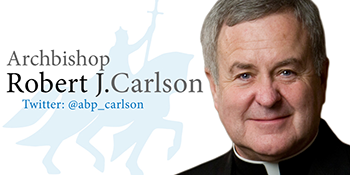
We celebrate the Feast of the Annunciation April 9.
On the feast, we hear a reading from the Prophet Isaiah, who tells us: “The virgin shall be with child, and bear a son, and shall name Him Emmanuel, which means ‘God is with us!’” A curious thing about this passage is that the Hebrew text simply says “a young girl” shall be with child. But when Jewish scholars translated it into Greek some 200 years before Christ, the Greek word they chose as the most accurate representation of the meaning of the Hebrew word — and no one would have known better than Greek-speaking Jewish scholars — was “virgin.”
Not only does the text have a prophetic meaning pointing to Mary’s conception of Jesus, the history of the text’s translation sharpens the point. In God’s providence, all things converge on Jesus.
In the Gospel, Gabriel greets Mary as “full of grace.” The Greek word that we translate as “full of grace” (or sometimes “highly favored one”) is actually not found anywhere else — not only in Scripture, but in any ancient sources. Like Mary, the term is unique in history.
The term also functions as a sort of name. The Catechism tells us that a name expresses a person’s essence and identity and mission (CCC 203). “Full of grace” certainly expresses those things about Mary.
On Tuesday, we hear of another name: a certain Joseph, whom the apostles re-named “Barnabas,” which means “son of encouragement.” The apostles must have seen that “son of encouragement” was the essence and identity and mission of this man, and named him accordingly.
“The Lord called me from birth, from my mother’s womb He gave me my name.”
Later in the week, we hear about the multiplication of the loaves and fishes. The episode ends with Jesus withdrawing from the people because He knew “that they were going to come and carry Him off to make Him king.” Jesus knows that “king” — in the sense in which the people intend the term — isn’t His identity or mission. He withdraws because He needs to show them, slowly and patiently, what kind of king He’s going to be — one who rules from the cross.
This is similar to the episode in which the Pharisees ask John the Baptist who he is. “Are you Elijah? Are you the Prophet?” John declines those names. He knows who he is, and who he is not.
God gives each of us a name, too. The better we know that name — our God-given identity and mission — the more deeply we experience two kinds of freedom: 1) Freedom for the mission that God gives us — which we see in Mary and Barnabas, and 2) Freedom from any false expectations about who we are and what we should do — which we see in Jesus and John the Baptist.
The Annunciation isn’t only about celebrating Mary’s cooperation with God’s plan for her life. It’s also about setting a pattern for our cooperation with God’s plan for our lives. Let’s pray to grow in the freedom of saying “yes” to God’s plan for our lives, and “no” to anything that interferes with that plan. The more we do so, the more everything in our lives will converge on Jesus.